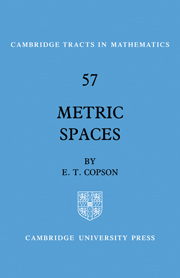Summary
This book, based on lectures given in the University of St Andrews, is intended to give honours students the background and training necessary before they start to study functional analysis.
There are many books on functional analysis; and some of them seem to go over the preliminaries to the subject far too quickly. The aim here is to provide a more leisurely approach to the theory of the topology of metric spaces, a subject which is not only the basis of functional analysis but also unifies many branches of classical analysis. The applications of the theory in Chapter 8 to problems in classical algebra and analysis show how much can be done without ever defining a normed vector space, a Banach space or a Hilbert space.
The reader is not expected to know much more classical analysis than is contained in Hardy's Pure Mathematics or Burkill's First Course in Mathematical Analysis. A knowledge of the elements of the theory of uniform convergence is assumed. Analytic functions and Lebesgue integrals are mentioned occasionally; their introduction provides more advanced applications of the theory of metric spaces, but adds nothing to the theory.
I am most grateful to Professor Arthur Erdélyi and to the Editors of the series of Cambridge Mathematical Tracts for their kindly criticisms and suggestions.
I wish to thank Mr Frank Gerrish and Professor Edwin Hewitt for many corrections, which have proved invaluable to me in the preparation of the second impression of this book.
- Type
- Chapter
- Information
- Metric Spaces , pp. vii - viiiPublisher: Cambridge University PressPrint publication year: 1968

